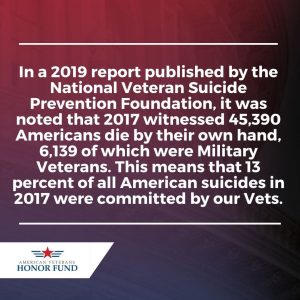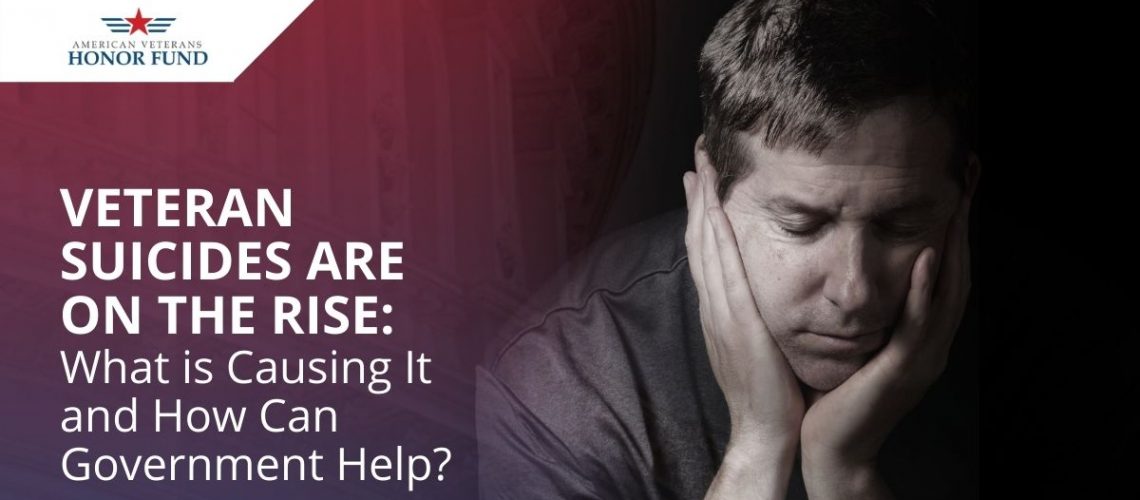As a society, America loses far too many of its citizens each year to suicide. While this loss of life is incredibly tragic under any circumstances, its effects on our Veteran communities are especially heartbreaking.
In a 2019 report published by the National Veteran Suicide Prevention Foundation, it was noted that 2017 witnessed 45,390 Americans die by their own hand, 6,139 of which were Military Veterans. This means that 13 percent of all American suicides in 2017 were committed by our Vets. The study concludes several disturbing finds: over 6,000 Vets have committed suicide each and every year from 2008-2017. Between 2005 and 2017, the average number of daily Vet suicides rose from 15.9 per day to 16.8. When adjusted for population differences for age and sex, the study concluded that Veterans are 1.5 times more likely to commit suicide than their counterparts who have never served in the military. But what is driving our Warriors to such unimaginable depths of despair and what can we do to help them?
These are questions that have been haunting the American psyche for years when discussing Veterans affairs, and one Veteran, named Greg Stube, wrote a moving Op-Ed for Fox News attempting to shed light on the complex problem. Stube, a Combat Vet who was injured in battle, spends his time speaking to Vets, Police, and other members of other high stress, high impact fields, and also wrote “Conquer Anything: A Green Beret’s Guide to Building You’re A-Team.”

For Stube, the motivation for Veteran Suicide was as unknowable to him as it is for many civilians struggling with the same question: “While I was in the Army, suicide was something I never understood or considered. It baffled me.” For him, this all changed, however, once he himself suffered severe injuries on the battlefield, being left to recover in a hospital burn victims’ unit. “I’d be lying if I said I never wished for death then. I was wounded horribly, which suddenly extricated me from the career, role and identity that made me whole.”
After an arduous struggle towards recovery, perhaps the greatest blow for Stube was the loss of identity which stemmed from his proud career in service:
“Soldiers like to say that after combat any kind of life at home is easy. That’s a lie; in fact, it can be torturous when the problems just keep coming. Family, relationships and financial issues are enough to ruin people who have otherwise easy lives. When this happens to a veteran battling for a sense of purpose after being damaged in war, they can give in to despair.”
While the unique perspective of our Military Veterans is one that the general public can’t relate to, this for Stube, is one of the greatest obstacles in bridging the gap in Suicide Prevention. “But everyone suffers. Many people see tragic things they can’t erase from their memories; still, they can’t exactly explain these things so that another person can completely see and feel them, but this doesn’t mean that others can’t relate.”
For Stube, creating an effective strategy to combat the plague of Veteran Suicides in our country means opening dialogue on shared human trauma and developing new positive identities for Veterans once their service is over. “Hope comes with a rebuilding of a useful and positive identity. This is hard, as the solution then is dependent on each individual. But we can all help them get there by realizing we can relate to them as human beings.” He maintains that it is critical to stop merely treating struggling Veterans as something “other than.” Their journey may be different than that of others struggling with mental health, but the solution is the same. Create purpose.
In June of this year, President Donald Trump signed an executive order aimed combatting the plague of Veteran Suicides, called PREVENTS. The order, which stands for “President’s Roadmap to Empower Veterans and End a National Tragedy of Suicide,” has a multipronged strategy meant to spread public awareness through media campaigns, provide greater employment opportunities for Veterans, and expand Federal partnership with State & Local governments, faith based leaders, and non-profit organizations to provide the support networks some of our Vets so desperately need. According to American Military News, the two year program will invest at least $53 million towards public awareness campaigns, provide grants towards community services for Veterans, and has already created partnerships with 30 large corporations to address the mental health of their employees.
This Executive Order appears to create a program which address the two most important things listed by Stube in his Op-Ed about understanding and combatting Veteran Suicide: Understanding and Purpose. Suicide is an intractable problem in society. Whether it be suicide in general, or Veteran Suicide in particular, there may never be a way to completely end its scourge on our society. As noted by Greg Stube, may of our soldiers have paid the Ultimate Price, and it is our responsibility as a society to protect those who have survived their tours of duty but have arrived home with wounds both apparent and unseen.
How can we help? Stube said it best:
“… we can all help them get there by realizing we can relate to them as human beings. Our government agencies, when they try to help them psychologically, need to help them find a new purpose as fathers and mothers, in a new career and more.”
Since the VA Scandal rocked the Obama Administration, providing healthcare to our nation’s veterans has been a hot button issue with all candidates who were seeking election for President in 2020. President Donald Trump’s solid record on the issue has made it an imperative for Democrat Candidates to offer their own vision. Read more here.


